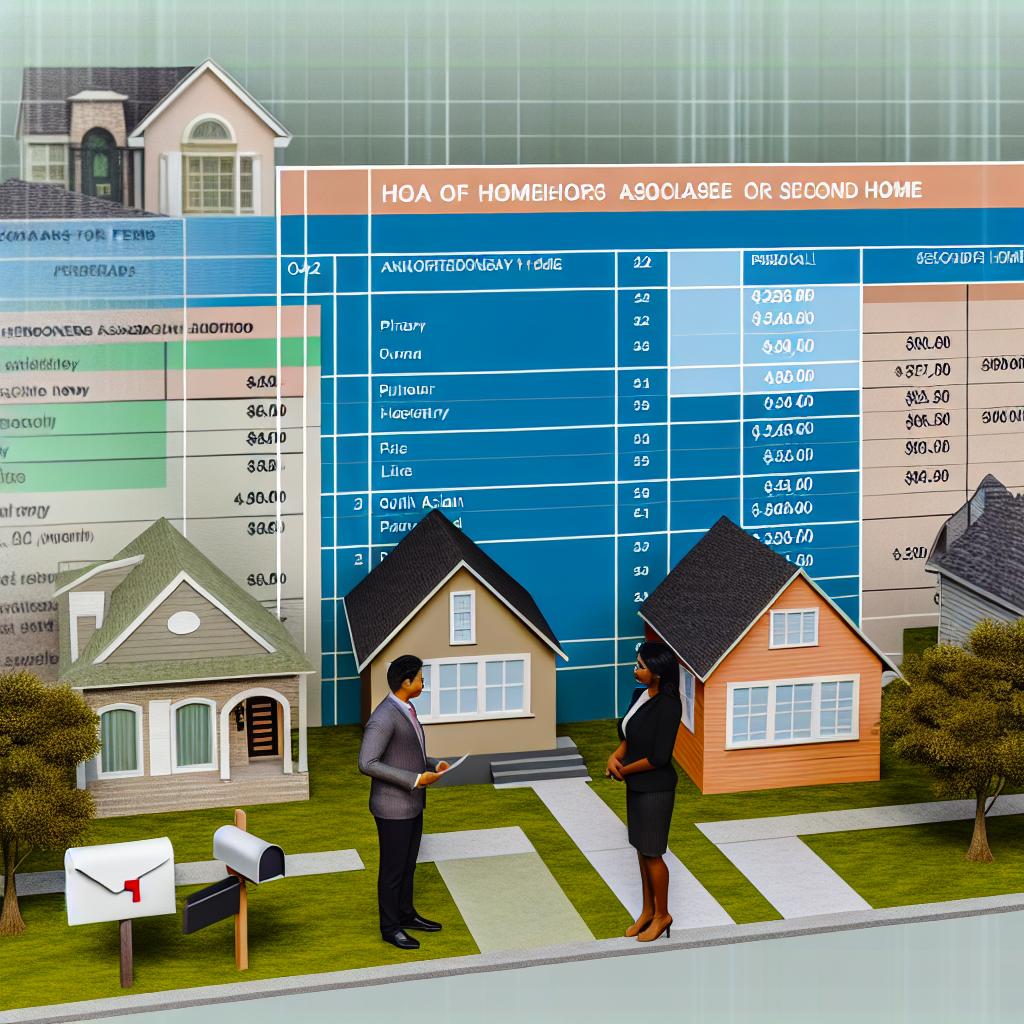Understanding HOA fees for second homes

Understanding HOA Fees for Second Homes
When acquiring a second home, it’s imperative to be aware of the various expenses involved, one of which includes Homeowners Association (HOA) fees. These fees are prevalent in properties situated within specified communities, such as condominiums, townhouses, or subdivisions. In this comprehensive guide, we will explore what HOA fees encompass and how they can influence your investment in a second home.
What Are HOA Fees?
HOA fees are regular financial obligations that homeowners must meet for the upkeep and maintenance of their community. These fees are typically allocated for services aimed at preserving the neighborhood or complex’s condition. Homeowners within the association must contribute to these fees, irrespective of how frequently they occupy the property.
Structure and Purpose
HOA fees are generally calculated based on the property’s size and the amenities offered within the community. The main purpose of these fees is to ensure that all common areas and facilities are adequately maintained, which is crucial for preserving the property’s overall value. These fees are generally collected monthly or annually, depending on the association’s policy.
Legal Obligations
Homeowners are legally bound by their community’s governing documents to pay these fees, which are often outlined in a homeowner’s contract at purchase. Failure to meet these obligations can result in penalties, fines, or even legal action, including liens on the property.
Services Covered by HOA Fees
The services incorporated within HOA fees can vary extensively based on the community’s unique characteristics. Typically, these services encompass several key areas:
Maintenance of Common Areas: Most HOA fees are applied toward the maintenance of shared spaces, such as parks, pools, clubhouses, and walking paths. This ensures these amenities remain accessible and alluring for all community members, promoting cohesion and collective enjoyment.
Landscaping: Another significant portion of HOA fees is allocated toward landscaping services, which maintain the public spaces and, at times, individual front yards. This consistent attention ensures the neighborhood’s aesthetic appeal remains high, potentially increasing property values over time.
Security Services: Enhanced security measures, such as gated entrances or dedicated security personnel, may also be funded by HOA fees. Such measures not only provide peace of mind for residents but may also contribute positively to the community’s overall reputation.
Property Insurance: Homeowners may benefit from property insurance included within HOA fees, covering common infrastructure and reducing personal liability for damage to shared spaces. This insurance is generally geared toward mitigating risks associated with natural disasters or unforeseen damages affecting multiple properties.
Reserve Funds: A prudent association sets aside a designated portion of the HOA fees for a reserve fund. This financial cushion is crucial in addressing significant future repairs and replacements, such as roofing, road resurfacing, or major infrastructure updates.
Impact on Second Home Ownership
While considering a second home, acknowledging the influence of HOA fees is crucial. Though they provide significant services and ongoing maintenance, they also add to the overall cost associated with property ownership.
Budgetary Implications
Incorporating HOA fees into your budget is paramount to ensuring your second home remains a financially viable investment. It is vital to evaluate all potential costs, including the HOA fees, alongside mortgage payments, property taxes, and other related expenses.
Rental Income Considerations
For those who plan to generate rental income from their second homes, high HOA fees could potentially diminish the profitability. It is prudent to assess how these fees will impact your overall return on investment and determine if the proposed rental rates can accommodate these added costs.
Property Value Influence
Effective HOA management can significantly enhance property values by maintaining appealing amenities and community spaces. Conversely, exorbitant fees or mismanagement can deter prospective buyers, influencing the property’s resale potential.
How to Evaluate HOA Fees
Before finalizing the purchase of a second home, it’s advisable to meticulously review and comprehend the HOA’s governing documents. These documents delineate fee structures, usage, and financial obligations. Key evaluations include:
Comprehensive Understanding: Ensure clarity regarding every service covered by the fees, as well as any additional expenses that may arise outside of customary payments.
Future Fee Projections: Inquire about any pending or anticipated increases in fees, as these could affect your financial planning over the long term.
Assessing Financial Stability: Investigate the association’s overall financial health, focusing on whether they maintain well-funded reserves for ongoing repairs and major maintenance projects. This evaluation can reveal insights into future expenses and the association’s fiscal responsibility.
Consultation and Resources
For a more thorough assessment, consider engaging with resources such as the Consumer Financial Protection Bureau. Real estate professionals familiar with the area can also offer valuable insights into HOA fees and their implications for second homeownership.
In summary, while HOA fees can significantly enrich the living experience within a community, they also represent an essential cost element that requires careful consideration when purchasing a second home. Armed with a comprehensive understanding of these fees and their impact, you can make informed decisions that align with your financial objectives and ensure the strength of your investment.
